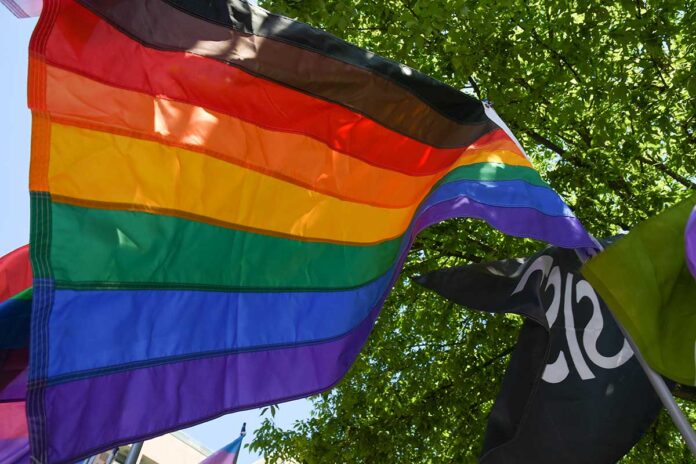The Pennsylvania state legislature has passed House Bill 2125 which will remove “homosexuality” from the definition of prohibited sexual acts in the state’s Crimes Code. The bill now heads to Gov. Wolf for his signature to codify the measure. When Wolf signs the law, Pennsylvania will no longer single out same-sex sexual acts as criminal.
HB 2125 was first passed last month by the state House in a unanimous vote. The state Senate passed the bill, also unanimously, on July 7. The bill ensures that same-sex relations will not be criminalized, should the U.S. Supreme Court rescind the landmark 2003 ruling in Lawrence v. Texas, which banned all sodomy laws pertaining to same-sex couples.
In his recent concurring opinion in the Dobbs v. Jackson case that rescinded Roe v. Wade, Justice Clarence Thomas cited Lawrence as a ruling that should also be overturned, as well as the 2015 decision in the marriage equality case of Obergefell v. Hodges, which legalized same-sex marriage.
Were Lawrence to be reversed, like the Roe reversal, any state whose anti-sodomy laws were nullified by the 2003 decision could revive those laws.
Rep. Todd Stephens (R-Montgomery) introduced HB 2125 and advocated for its passage. Stephens said, “this was a long time coming—too long. No one in the LGBTQ community should be made a criminal because of who they love. Yet, even as we reformed our marriage laws, our statutes remained stuck in the past. I’m thrilled this passed unanimously in both chambers and will be signed into law. Love should never be illegal. Eliminating this archaic language will also help promote a culture of acceptance and inclusion for our LGBTQ community across Pennsylvania.”
In a statement, state Rep. Malcolm Kenyatta (D-Philadelphia), one of only three LGBTQ+ members of the Pennsylvania General Assembly who recently ran for U.S. Senate, said that the action was “about a couple centuries overdue, but a big deal nevertheless. It is my hope that this will be another step towards destigmatizing LGBTQ+ individuals and protecting the community from possible future court decisions.”
Directly referencing Thomas’s opinion, Kenyatta added, “when Justice Thomas concurred in the decision to overturn Roe v. Wade, he mentioned Lawrence v. Texas, which ruled that sodomy laws are unconstitutional, as a decision the court should overturn. Should the court do that and had this language remained in the Crimes Code, it would have presented a grave threat to LGBTQ Pennsylvanians.”
The passage of HB 2125 will, Kenyatta said, protect LGBTQ Pennsylvanians from such a threat. “We remove that cloud of shame and fear to create a Pennsylvania that is fair for all,” he said.
The Pennsylvania Youth Congress, which advances freedom and justice for young LGBT Pennsylvanians through advocating for responsible public policy, supports Stephens and the bill.
Preston Heldibridle, executive director of the Pennsylvania Youth Congress, said “this bill corrects a grave wrong under our law — especially at a time when many LGBTQ Pennsylvanians feel they face an uncertain future. However, there is much more work to be done to make our commonwealth safe and welcoming for all. Now that the General Assembly has agreed, unanimously in both chambers, that LGBTQ Pennsylvanians are not obscene they must take the next step to ensure equal dignity under the law by passing LGBTQ-inclusive nondiscrimination protections.”
As PGN has reported, over a dozen states, including Texas, are already considering reviving state-level anti-sodomy laws. Many such laws remain on the books.
Texas Attorney General Ken Paxton has said in interviews that he will enforce the state’s sodomy laws if the Supreme Court overturns Lawrence. Should that happen, those convicted under the law would pay a fine of up to $500 per incident or more and serve up to 180 days in county jail if the charges are “enhanced.” Repeated and/or consistent violations could also require queer people charged to register as sex offenders.
References to homosexuality in the Pennsylvania commonwealth’s laws are vestiges of a centuries-old anti-sodomy law. That law was repealed for married heterosexual couples in 1975, and for same-sex couples in 1995.
PGN has reported that prior to 1960, every state plus D.C. had laws criminalizing same-sex sexual relations. Those laws have been used to criminalize lesbian mothers and other gay, lesbian and bisexual people. The famed civil rights leader Bayard Rustin was once arrested and jailed for sodomy and forced to register as a sex offender. According to a report in The Washington Post, in 2021, lawmakers in California asked Gov. Gavin Newsom (D) to posthumously pardon Rustin and “right this wrong.”
There are still 14 states with anti-sodomy laws and some states, including Pennsylvania, have laws that criminalize homosexuality itself as “depraved” or “obscene” activity, while others categorize it like prostitution or even bestiality.
In Pennsylvania, homosexuality was still included under the state’s definition of “prostitution,” and in another section of criminal law referencing “obscene and other sexual materials and performances.”
While the unanimous vote to remove homosexuality from the criminal code is a major step toward some recognition of LGBTQ equality, the GOP-led General Assembly includes many Pennsylvania lawmakers, including gubernatorial nominee Doug Mastriano, who are opposed to all LGBTQ rights, including same-sex marriage.
Concomitant with that, Pennsylvania does not have a nondiscrimination law that includes LGBTQ people. Same-sex marriage in Pennsylvania was only legalized because of the Supreme Court’s decision in Obergefell v. Hodges, which Mastriano and GOP Senate candidate Mehmet Oz support overturning.
The Pennsylvania Youth Congress noted in a statement that House Bill 2125 marks “only the second time in Pennsylvania history a bill specifically to advance LGBTQ inclusion is being sent to the Governor. The first was in 2003 when the Republican-controlled General Assembly passed LGBTQ-inclusive hate crimes law, which was overturned by the Commonwealth Court in 2008 on a technicality.”
